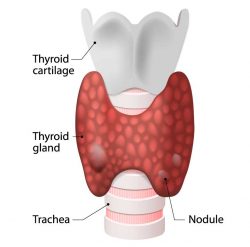
Thyroid Maintenance
The thyroid, located in the neck just above the collar bone, is a small gland described as having a butterfly shape. The thyroid is an endocrine gland which means it is an organ that secrete hormones into the body.
The thyroid is also referred to as a metabolic gland because the hormones it discharges control metabolism, which is the process of turning food into energy. The hormones the thyroid secretes control metabolic activities such as the rate at which the body burns calories and the pace of a heartbeat.
When the thyroid secretes hormones abnormally, patients experience a variety of symptoms including:
- Dry Skin
- Fatigue
- Memory Problems
- Fluid Retention
- Racing Heartbeat
Depending on the specific cause of the thyroid problem, symptoms vary.
Common Thyroid Problems
Thyroid disorders differ greatly but the following conditions are the most common:
- Goiter – Goiter is the abnormal enlargement of the thyroid gland.
- Hyperthyroidism – In this situation, the thyroid gland makes more thyroid hormones than the body requires.
- Hypothyroidism – This is a condition when the thyroid gland does not make enough thyroid hormone that the body requires.
- Thyroid Cancer – As with other cancers, this is a condition where abnormal cells are growing in the thyroid.
- Thyroid Nodules – Thyroid nodules are abnormal lumps of thyroid tissue growing in the thyroid gland.
- Thyroiditis – This is the inflammation and swelling of the thyroid gland.
 Thyroid disorders range from a harmless goiter which requires no treatment to life threatening cancer. Dr. Ward identifies and detects the type of thyroid problems that are being experienced and provides an adequate treatment plan.
Thyroid disorders range from a harmless goiter which requires no treatment to life threatening cancer. Dr. Ward identifies and detects the type of thyroid problems that are being experienced and provides an adequate treatment plan.
The most common thyroid problems are comprised of the abnormal production of thyroid hormones. An imbalance of thyroid hormones results in either hyperthyroidism (too much hormone production) or hypothyroidism (too little hormone production).
While the effects of thyroid disorders can be unpleasant, most thyroid problems can be managed well if under the care of Dr. Ward.
Causes of Thyroid Disorders
There are a variety of hyperthyroidism disorders but they are caused by diverse conditions:
- Graves’ Disease: This is a disorder caused by excessive production of thyroid hormones.
- Toxic Adenomas: When a single nodule develops in the thyroid gland and begins to secrete excessive hormones, it can lead to hyperthyroidism.
- Subacute Thyroiditis: In this condition, the inflammation of the thyroid causes the gland to “leak” excess hormones, resulting in hyperthyroidism. This form of the condition usually only lasts a few weeks.
- Pituitary Gland Malfunctions: Although rare, an abnormal pituitary gland may cause hyperthyroidism.
- Cancerous Thyroid Growths: Hyperthyroidism can develop from cancerous growths in the thyroid but this is also rare.
Hypothyroidismis also caused by a variety of factors causing a drop in hormone production that leads to lower energy levels. Hypothyroidism causes include:
- Hashimoto’s Thyroiditis: This is an autoimmune disorder where the body attacks the thyroid tissue. The tissue eventually dies and stops producing hormones.
- Removal of the Thyroid Gland: In cases where the thyroid gland is surgically removed or chemically destroyed, the gland cannot produce requisite hormones.
- Excessive Iodide Exposure: Medications or dyes that include iodide may lead to hypothyroidism.
- Lithium: The use of the drug lithium has been linked to hypothyroidism.
Thyroid Maintenance Treatments
If hyperthyroidism, hypothyroidism, or other thyroid abnormalities that go untreated for long periods of time are dangerous and may even become life threatening. Call Dr. Ward for an appointment to diagnose, treat and set up a thyroid maintenance program to enhance your quality of life.
